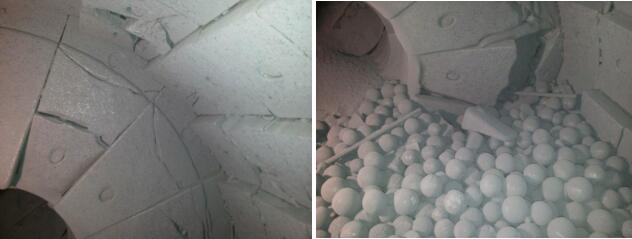We have a Russian customer, who has a cement clinker production line, which includes a Ф 2.2m × 6.5m ball mill. One month after the ball mill was put into operation, the mill liners and step liner of the first bin were broken frequently. At most, 18 pieces were broken in one week, which needs to be replaced. It costs a lot.

Fracture location diagram
Cause analysis and treatment
First of all, consider whether there is a problem with the lining quality. The material of the damaged grinding headliner and step liner is zg40cr2mnsi2more, HRC hardness index is 48 ~ 50, impact toughness is ≥ 59 J / cm2. The factory inspection is qualified,
It has been used in other projects normally without any abnormal conditions such as fracture and breakage.
Secondly, check whether the grinding body gradation is reasonable, the hardness of the steel ball HRC ≥ 58, the toughness ≥ 3 J / cm2, the damage rate ≤ 0.5%, and the basic indexes are within the design range. The grading in the mill is shown in Table 1. According to the conventional feed size range of 0 ~ 50 mm, the proportion of 0 ~ 25 mm material is about 70%, and the configuration is reasonable.
After drying, more than 95% of the iron slag and kaolin are in powder form, the fineness is 80 μ m, and the sieve residue is 20%; the particle size of some large materials is 20 mm ~ 35 mm. The fineness of the feed material is much smaller than that designed by the ball mill manufacturer.
| Item | Specifications | Design quantity/t | MaterIal | |
| Grinding Media | First Cabin | Ф80 mm | 3 | High Chrome |
| Ф70 mm | 5 | High Chrome | ||
| Ф60 mm | 4 | High Chrome | ||
| Ф50 mm | 2 | High Chrome | ||
| Grinding Media | Second Cabin | Ф20 mm×20 mm | 6 | High Chrome |
| Ф16 mm×16 mm | 10 | High Chrome | ||
| Ф14 mm×14 mm | 5 | High Chrome | ||
The grinding sound of the mill is too clear and harsh. The grinding sound value of the electric ear is 158 dB, which is obviously higher than the normal 120 dB standard. It is fully explained that the mill load is too small, the feed quantity is too small, and the steel ball impacts the liner for a long time, resulting in fracture.
Based on the above analysis, the unreasonable grading of steel balls is the fundamental reason for the over-grinding of the ball mill. Therefore, the steel ball gradation is adjusted, as shown in Table 2. At the same time, the feed rate was increased according to the grinding sound and grinding fineness. After adjustment, not only the per hour output increased to 20 ~ 25 t / h, but also the mill liner was not damaged frequently.
| Item | Specifications | Design quantity/t | MaterIal | |
| Grinding Media | First Cabin | Ф60 mm | 3 | High Chrome |
| Ф50 mm | 5 | High Chrome | ||
| Ф40 mm | 4 | High Chrome | ||
| Ф30 mm | 2 | High Chrome | ||
| Grinding Media | Second Cabin | Ф20 mm×20 mm | 6 | High Chrome |
| Ф16 mm×16 mm | 10 | High Chrome | ||
| Ф14 mm×14 mm | 5 | High Chrome | ||
The Result
In the initial stage, the owner only provided the chemical composition and moisture content of the material but did not give the particle size of the material. According to the conventional data, the ball mill manufacturer designs the grading of the grinding body, and the mill liner is purchased by the general contractor. When finding out the causes, the general contractor failed to analyze the problems systematically and took it for granted that the quality of the lining plate was unqualified, and the change of raw materials was ignored. It was necessary to adjust the gradation and feed rate, and the effect was good after treatment.



